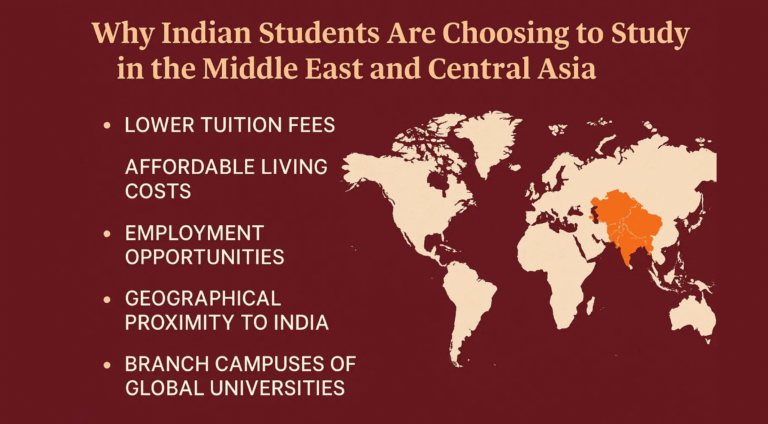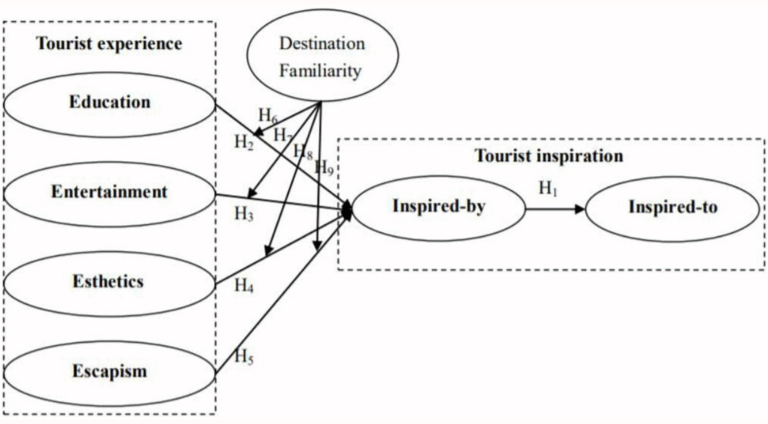Study Abroad Consultants In Delhi
Next-Gen Destinations: Why Indian Students Are Choosing UAE, Turkey & Kazakhstan Over Traditional Countries
Global education is evolving. In recent years, Indian students are beginning to consider Next-Gen destinations. Such as the UAE, Turkey, and Kazakhstan, countries that may not have been previously considered. At least compared to the US, UK, or Canada. Whatever this is a new trend, it is indicative of a larger shift in the thinking of young learners who now want quality education with affordability, cultural diversity, and positive post-study opportunities. The developments within the next-gen destinations are both reshaping academic migration patterns and the phrase “studying abroad” in 2026 and beyond.

Understanding the Shift to Next-Gen Study Destinations
For years, studying in the United States or the United Kingdom has been the long-standing hope of many. However, due to rising tuition costs, visa hurdles, and a more competitive global environment, Indian students have looked elsewhere. Next-Gen destinations (or Next-Gen Education Hubs) refer to up-and-coming education centers combining international standards and affordability, safety, and proximity to India.
Countries such as the United Arab Emirates (UAE), Turkey, and Kazakhstan have developed their higher education ecosystems, established English-medium programs, and developed student-friendly policies that attract international students. For high-achieving and adventurous Indian students, these Next-Gen Hubs will provide students with modern campuses, globally recognized degrees, and an opportunity to flourish in developing economies at a fraction of the price paid to study abroad in the traditional countries.
Why UAE is Emerging as a Top Next-Gen Education Hub
The United Arab Emirates (UAE) is emerging as one of the most promising Next-Gen locations for Indian students. While the country is known for its skyscrapers and booming economy, it has developed rapidly into an educational powerhouse in the region.
Quality Education and Global Campuses
In the United Arab Emirates, there are upwards of 80 international branch campuses from universities of similar British or Australian origin, including Heriot-Watt University (United Kingdom), Middlesex University, and the University of Wollongong (Australia). These institutions confer degrees that are recognized by the same standards and practice as those earned in their respective universities.
Indian students have shown great interest in all of this, as it provides the opportunity to obtain a Western-style education while remaining relatively close to home. In addition, the Ministry of Education within the UAE adheres to strict accreditation standards to monitor quality of degree, so students can expect to receive a degree that holds academic weight across programs.
Affordability and Proximity
The cost of studying in the UAE is notably lower than in Western countries. The tuition fee is between $10,000 and $20,000 per year, approximately half of what you would pay to study in the US or UK. In addition, the UAE is only 3 to 4 hours by plane from India, which makes it easier for students and families to stay connected.
The cost of living is reasonable, with various universities offering accommodation and options for part-time work on the campus.
Post-Graduation Opportunities
The UAE’s new education system complements its economy as industries in technology, finance, tourism and logistics continue to expand and create jobs for international graduates. The Golden Visa policy offers additional support for bright students to remain and work after graduation. All of these factors make the UAE one of the most progressive Next-Gen study destination for higher education.

Turkey: A Blend of Culture, Affordability, and Academic Excellence
Another strong competitor in the Next-Gen category is Turkey. Turkey geographically and culturally connects Europe and Asia, and has a unique offering of considerable heritage, modern facilities, and easy access to education.
Globally Recognized Universities
Turkey is home to more than 200 public and private universities, many of which are in global rankings. The Middle East Technical University, Istanbul Technical University, and Koç University are only a few institutions that accept thousands of international students every year.
The majority of programs, especially those directed toward international students, are delivered in English. Because of this, Turkey is a friendly Next-Gen option for students who want to go abroad that doesn’t require them to study in a foreign language.
Explore more Next-Gen study abroad guides and 2026 admission tips! Read More
Low Cost of Education and Living
The annual tuition fee in Turkey ranges from $4,000 to $8,000, and the cost of living is among the cheapest in Europe. Indian students can live on a very modest budget for food, accommodations, and travel expenses.
Additionally, the Turkish government provides international students with numerous scholarships and research grants, helping to alleviate financial pressure.
Post-Graduation Prospects
With its diverse and vibrant economy, Turkey has a variety of employment opportunities in fields such as engineering, architecture, healthcare, and tourism. While work permits for international students take some planning, there are many opportunities for work through internships and research partnerships.
In conclusion, Turkey’s combination of affordable quality education, rich culture, and hospitable nature make it a top Next-Gen destination for 2026.

Kazakhstan: The Underrated Next-Gen Gem of Central Asia
When discussing Next-Gen education, Kazakhstan often surprises students as a serious option — yet it deserves recognition for its strong educational reforms and internationalization efforts.
Growing Education Infrastructure
Kazakhstan has invested greatly in improving its education sector so that it can emerge as the leading education destination in Central Asia. Educational institutions, such as Nazarbayev University, Al-Farabi Kazakh National University, and KIMEP University, offer academic programs in English that are on par with what is offered to students globally.
Many of these universities also partner with western universities to offer dual degrees, and student exchange programs — an attractive prospect for students seeking Next Gen education opportunities.
Affordability and Accessibility
The annual tuition costs in Kazakhstan are some of the lowest in the world, averaging between $3,000 and $6,000 annually, while room and board and general living expenses can be kept low, averaging approximately $300–$500 monthly.
For Indian students from middle-income households, this factor creates an affordability appeal to Kazakhstan as a potential Next-Gen destination that offers good academic quality without cost deficiency.
Post-Graduation Pathways
Kazakhstan’s economy is undergoing growth in areas such as energy, healthcare, and IT which provides opportunities for more available careers. Initiatives by the government, to bring in more qualified international graduates, are helping with visa flexibility so that the transition from studies to employment can occur more fluidly.
Check official UAE, Turkey, and Kazakhstan university updates here! Visit Now
Comparing Traditional and Next-Gen Destinations
To appreciate why Next-Gen destinations are so attractive, it is useful to look at the differences compared to the more traditional options, such as the US, UK, Canada, and Australia. While these countries continue to have many of the highest-rated universities, they are expensive, they have more competition for admission, and they have disjointed visa processes.
The Next-Gen destinations: the UAE, Turkey, and Kazakhstan offer:
Tuition and living costs within reach of most families
Common cultural experiences
Easier and cost-efficient visa and admission processes
Less competition for post-study work
Training facilities and programs with advanced research and study opportunities, and universities that are global
This combination helps Indian students have a global experience without the financial commitment or complex processes that usually accompany study in traditional destinations.
The Role of Cultural Familiarity in Choosing Next-Gen Destinations
Cultural adaptability is a significant factor contributing to student success. Next-Gen destinations, such as the UAE and Turkey, have cultural similarities with India, life style, norms, traditions, cuisine, and festivals.
For example, the very large Indian diaspora in the UAE ensures that students will not feel distance from their roots. Similarly, the very hospitable culture of Turkey and the friendly nature of Kazakhstan create a supportive environment in the experience of young Indians studying abroad.

Next-Gen Education: Aligning with Future Job Markets
Indian students are also attracted to destinations labeled as “Next-Gen” because of their emphasis on relevance to industry. Universities in these locations are updating curricula to align with the needs of the global market, especially related to artificial intelligence, business analytics, sustainable design, and healthcare innovation.
These programs often engage the students with real industries through practicums, partnerships, and research initiatives so that they graduate prepared for jobs. As modern economies transition to innovation-based economies, Next-Gen education models are training students to succeed.
Scholarships and Financial Aid in Next-Gen Countries
Affordability doesn’t just end at the cost of tuition. Governments and universities in these Next-Gen locations are clearly making an effort to provide scholarships and grants to attract international talent.
The UAE has merit-based scholarships associated with its leading universities, Turkey has the renowned Türkiye Scholarships program, and Kazakhstan has national and university funding for students who achieve high performance.
These financial supports open the possibility for a broader range of Indian Undergraduates who may view studying abroad as financially prohibitive to benefit from Next-Gen education.
Challenges and Considerations
While Next-Gen destinations have many benefits, there are also recognized challenges. Certain programs at specific institutions in Turkey, or Kazakhstan, could pose language issues, even though most elite institutions offer English-medium programs.
Post-study work opportunities are expanding, but compared with established destinations, most provide a still-evolving experience in this regard. Nevertheless, both governmental initiatives and international partnerships help to alleviate these challenges, and their effectiveness is gradually felt in Next-Gen destinations.
The Future of Next-Gen Education for Indian Students
As global education trends change, Next-Gen destinations are likely to gain more popularity. The UAE, Turkey, and Kazakhstan are not just affordable alternatives but innovative ecosystems that include employability and inclusivity.
Indian students in 2026 and beyond are challenging the idea of study abroad — prioritizing quality, experience, and opportunity over traditional prestige. This shift represents a significant trend in international education, one where accessibility and adaptability fundamentally govern future global citizens.
FAQs on Next-Gen Study Destinations
Q1. Why are Indian students choosing UAE, Turkey, and Kazakhstan over traditional destinations?
These Next-Gen destinations offer affordable education, quality institutions, cultural familiarity, and growing post-graduation opportunities.
Q2. Are degrees from these Next-Gen destinations recognized globally?
Yes, most universities in these countries are internationally accredited and have partnerships with global institutions.
Q3. Is English widely used in these Next-Gen study programs?
Yes. Leading universities in the UAE, Turkey, and Kazakhstan offer English-taught programs across various disciplines.
Q4. What are the average tuition fees in these countries?
On average, tuition fees range from $3,000 to $20,000 annually, depending on the country and institution.
Q5. Can students work while studying in these destinations?
Yes, part-time work options are available in the UAE and Turkey. Kazakhstan also allows internships and limited work permits for international students.
Discover your perfect Next-Gen study destination today—UAE, Turkey, or Kazakhstan!
Conclusion:
Higher education is changing in ways we haven’t seen before, and Next-Gen destinations are reshaping global study options for Indian students. The UAE, Turkey, and Kazakhstan are making affordability, global exposure, and job opportunities accessible to students in ways we haven’t seen from traditional destinations.
For students interested in 2026 intakes, exploring these Next-Gen educational centers could provide world-class experiences in culturally rich settings with the opportunity for a more fruitful future compared to the costs and competition we are seeing from other study-abroad nations.
